New Delhi: The Supreme Court Monday said the Centre is bound to honour its commitment given to Portugal, and release gangster Abu Salem on completion of his 25-year sentence in the 1993 Mumbai blasts case.
Salem had said his sentence could not exceed 25 years as per the assurance given by India to Portugal for his extradition in 2002. The assurance was given to Portugal by the then Deputy Prime Minister L K Advani.
A bench of Justices S K Kaul and M M Sundresh said the Central government is bound to advise the President of India for exercise of power under Article 72 of the Constitution and the national commitment on completion of his sentence.
“The necessary papers be forwarded within a month of completion of 25 years. In fact, the government can itself exercise the power of remission under CrPC within the time period of one month upon completion of 25 years,” the bench said.
The Centre had told the top court that the question of the Union of India honouring its assurance dated December 17, 2002 will arise only when the period of 25 years is to expire which is November 10, 2030.
On February 25, 2015, a special TADA court had awarded life imprisonment to Salem in another case for murdering Mumbai-based builder Pradeep Jain in 1995 along with his driver Mehndi Hassan.
Salem, also a convict in the 1993 Mumbai serial blasts, was extradited from Portugal on November 11, 2005, after a prolonged legal battle.
The top court had May 5 reserved its judgement in the matter in which the Centre had argued that the judiciary is independent of the solemn sovereign assurance given to the Portugal government during the extradition of Salem and it is up to the executive to take a call on it at an appropriate stage.
Appearing for the Centre, Additional Solicitor General K M Nataraj had told the court that the “government is bound by the solemn sovereign assurance given by then deputy Prime Minister L K Advani to the Portugal government and it will abide by it at an appropriate time”.
He had argued that the court is not bound by the solemn assurance and it can pass orders as per the law.
“Solemn sovereign assurance cannot be forced on the judiciary. The Executive will act on it at an appropriate stage. We are bound by the solemn sovereign assurance in this regard. Judiciary is independent, it can proceed as per law,” he had said.
The bench had told Nataraj that arguments made by advocate Rishi Malhotra, representing Salem, was that the court should decide on the solemn assurance and reduce his sentence from life term to 25 years or direct the government to take a call on the assurance given during his extradition.
The top court had observed that the second issue was of a set-off period as the argument made at the bar was that Salem was arrested in Portugal subsequent to a red corner notice issued on the orders of the court here and he has gone detention there till his extradition to India.
Nataraj had argued that there are judgements to the effect that a life sentence means entire life and there could be no remission.
Malhotra had argued that the assurance was in clear terms that if extradited by Portugal for trial in India, Salem would not be awarded death penalty or imprisonment for a term beyond 25 years.
“The said solemn assurance dated December 17, 2002, was further reiterated by way of supplementary assurance by the Ambassador of India to the Government of Portugal May 25, 2003, with a further assurance that the appellant will not be prosecuted for offences other than those for which his extradition has been sought,” he had said.
In June 2017, Salem was convicted and later awarded life sentence for his role in the 1993 serial blasts case in Mumbai.
On March 12, 1993, the country’s commercial capital had witnessed an unprecedented attack with 12 explosions that took place one after another in about two hours.
The dastardly attacks had left 257 dead and 713 people seriously injured, and destroyed properties worth crores.






































